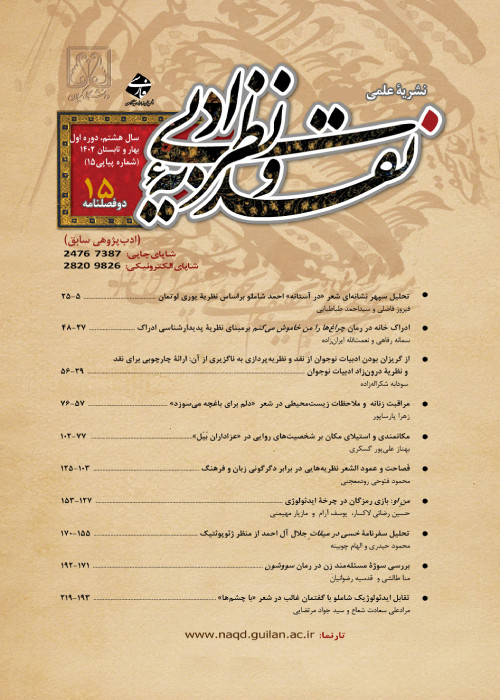A Study of the Social Identity of Nima Yushij’s Maneli based on Critical Discourse Analysis
Using Norman Fairclough’s approach in critical discourse analysis, this paper aims to study Nima Yushij’s narrative poem Maneli in order to shed light on Nima’s ideology regarding the social identity of the intellectuals and the deprived classes of society. Therefore, what is considered here is the narrative agents’ social identity in the poem’s conversations and scenes. Pari and Maneli, as imaginary characters, represent Iranian society’s life-world and ideology in the years 1945-1957. In contrast to the ruling discourse and other discourses, Nima creates Maneli during these 12 years. Maneli is the symbol of escaping from reality and society to the land of Nowhere (the land of the sea) in the process of social changes. At the end of the narration, Maneli’s despair and escape from his corrupt community is reminiscent of the social status after the 1953 coup d’état. Nima’s poem describes the fate of the movement of class determinism towards Utopia. The data has been collected through documentation, and the text has been analyzed in a descriptive-analytical manner.
From the discourse analysis perspective, texts reflect ideology and social relations. In the present article, the poem Maneli is analyzed based on Fairclough’s critical discourse analysis. Nima Yushij’s Maneli was created in response to Sadegh Hedayat’s translation of Urashima. This poem, which took twelve years to complete, retells the story of a poor fisherman who faces the inequality of social relations and the utopian world of fairy tales. The main question in the present article is: what discursive and ideological space affect the production of the social identity of the characters in this poem.
Theoretical Framework
According to Fairclough, critical discourse analysis is a combination of textual analysis, the analysis of the process of production, distribution and consumption of texts, and the socio-cultural analysis of the discursive event as a totality. An important goal of critical analysis is to eliminate power/hegemony in both theory and practice. Within the framework of critical discourse analysis, Fairclough considers textual analysis to be a combination of linguistic and inter-textual analyses, and examines the discourse at three levels of description, interpretation and explanation.
Maneli was selected for the present article based on purposeful qualitative methodology. Of different types of critical discourse analysis, Fairclough’s approach, due to its methodology, was the most applicable here.
Maneli and Pari, as the main characters in the poem, appear as opposing subjects at the beginning of the poem and their relationship and identities are represented through semantic relations. Maneli is the product of his socio-historical context and production system and, because of his social class and poverty, has a lowly social status. Based on the expressive and experimental values of the narrator, Pari has a paradoxical lover-beloved quality. In this poem, Nima Yushij represents power in the socio-economic system of production, which suffers from inequality.
Nima Yushij draws on verbal-visual discourse and narrative poetry to express his ideology in the literary tradition of the contemporary era. To oppose the despotic, capitalist discourse of the Pahlavi era, and the materialistic discourse of the Tudeh Party, he relies on the idealistic-realistic discourse, revolving around freedom, love and humanism. Pari and Maneli are two imaginary characters that formulate the social identity of the intellectuals and the lower class. This poem somehow shows the movement from the Marxist class determinism to idealism. The discourse followed by the second Pahlavi monarch, through freedom of the press, modernism, establishment of parties and civil institutions, such as the Association of Iranian Writers, affected social activists, such as Maneli, moving him from realism to idealism. Disappointment with a corrupt society at the end of the poem is typical of the intellectuals and lower classes in the years following the 1953 coup d'état in Iran.
- حق عضویت دریافتی صرف حمایت از نشریات عضو و نگهداری، تکمیل و توسعه مگیران میشود.
- پرداخت حق اشتراک و دانلود مقالات اجازه بازنشر آن در سایر رسانههای چاپی و دیجیتال را به کاربر نمیدهد.



